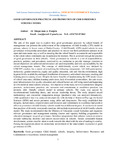GOOD GOVERNANCE PRACTICES AND PROMOTION OF CHILD FRIENDLY SCHOOLS MODEL
Abstract
The aim of this paper was to explore how good governance practices by school boards of management can promote the achievement of the components of child friendly (CFS) model in primary schools in lower zones of Embu County. Child Friendly (CFS) model adopts its own governance or leadership procedures and practices to ensure that their jurisdiction operates in an open and transparent way as well as ensuring that the school board is accountable and responsible to the whole school community and in particular the learners. This is achieved through the practice of good governance in their schools. Good governance in schools is a set of responsibilities, practices, policies, and procedures exercised by an institution to provide strategic direction to ensure objectives are achieved and resources are used responsibly and with accountability by the school management boards. The concept of child-friendly school which was initiated by UNICEF’s studies, has a nature of actualizing the following components, full child participation, inclusivity, gender sensitivity, equity and quality education, safe and friendly environment, high hygiene levels, availability and equal distribution of resources, safe school structures, teaching and learning process among others. Despite the know benefits of implementing the CFS model issues of school drop rates, children learning under trees, lack of essential commodities, like safe water, poor infrastructures low quality education and cultural factors are still being noted and happening in CFS model in some schools in Kenya. The objectives of the study were to examine how integrity practices, inclusiveness practices, and resources and commitment to excellence practices can promote child friendly schools model in primary schools. The study was guided by transformational leadership theory and servant leadership theory. The study adopted mixed methodology and concurrent triangulation design. Qualitative data was analyzed thematically, while quantitative data was analyzed descriptively with the help of Statistical Package for Social Sciences (SPSS) and results presented using tables and frequencies. The study established that integrity, inclusiveness, responsiveness and resources and commitment to excellence had positive effect on promotion of child friendly schools model but at different degrees. It was however noted that practices of diversity were poorly rated and did not help in promotion of child friendly schools model. The study recommended that the Ministry of Education should formulate and organizes relevant governance and management training courses and capacity building programmes for education managers on good governance. Introduce programmes that enhance system awareness towards embracing diversity and utmost inclusiveness in schools. Ensure sustainable human development, actions must be taken to work towards this ideal with the aim of making it a reality. Putting the regulations about the democratic involvement of the stakeholders in practice of good governance in CFS

